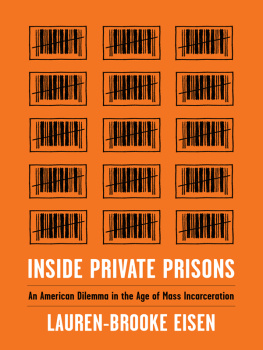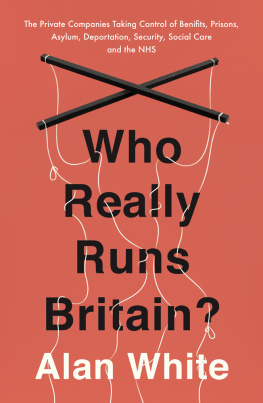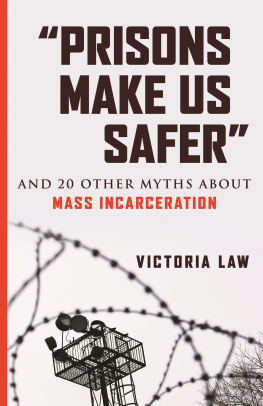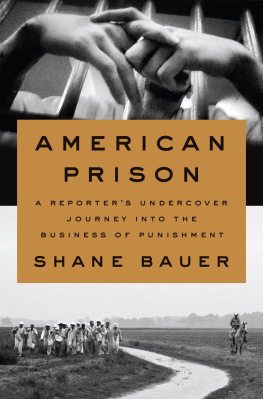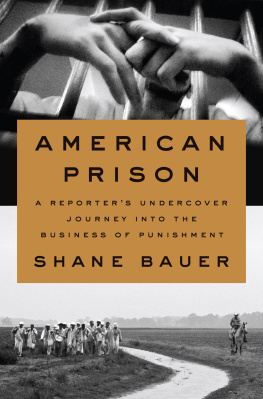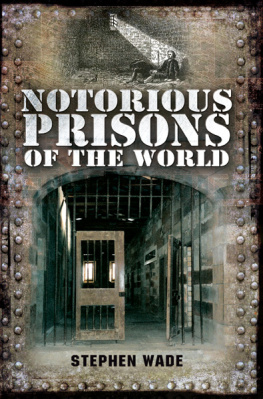Table of Contents
Inside Private Prisons
INSIDE PRIVATE PRISONS
An American Dilemma in the Age of Mass Incarceration
Lauren-Brooke Eisen
Columbia University Press
New York
Columbia University Press
Publishers Since 1893
New York Chichester, West Sussex
cup.columbia.edu
Copyright 2018 Lauren-Brooke Eisen
All rights reserved
E-ISBN 978-0-231-54231-9
Library of Congress Cataloging-in-Publication Data
Names: Eisen, Lauren-Brooke, author.
Title: Inside private prisons : an American dilemma in the age of mass incarceration / Lauren-Brooke Eisen.
Description: New York : Columbia University Press, [2017] | Includes bibliographical references and index.
Identifiers: LCCN 2017027653 | ISBN 9780231179706 (alk. paper)
Subjects: LCSH: PrisonsUnited States. | PrivatizationUnited States. | CorrectionsContracting outUnited States.
Classification: LCC HV9469 .E57 2017 | DDC 365/.973dc23 LC record available at https://lccn.loc.gov/2017027653
A Columbia University Press E-book.
CUP would be pleased to hear about your reading experience with this e-book at .
Cover design: Milenda Nan OK Lee
Cover image: Shutterstock
Contents
THIS ENDEAVOR WOULD not have been possible without the guidance of many colleagues, the support of my family and friends, and countless cups of coffee.
This book owes so much to the thoughtful and careful editing of Stephen Wesley, who believed in this project from day one. His vision of the book guided me along this journey, and his patience with my late night emails filled with bullet points is very much appreciated. To my agent and dear friend, Stefanie Lieberman, thank you for spending hours on the phone explaining the ins and outs of the publishing world to me and continuing to serve as one of my chief advocates. I also appreciate the detailed feedback from peer reviewers at the Columbia University Press, all of whom had thoughtful and important critiques of early chapters.
To my Brennan Center colleagues, thank you for your support of this project. I owe a huge debt to Inimai Chettiar, who blessed this project from the beginning and challenged me to explore the powerful role of incentives to change public policy. To Fritz Schwartz, thank you for reading early chapters and providing feedback and for your encouragement to dig into the subject matter more deeply. To Michael Waldman, for teaching me how to fight for our democracy and inspiring me with your own tales of all-nighters to finish books. To Dorothy Samuels, for taking the time to think through some of the books challenges with me, and for your invaluable advice on this project. To Elisa Miller, for reviewing the manuscript and for her continued support of this project. To John Kowal, Vivien Watts, Mike German, Beatriz Aldereguia, Nicole Fortier, Ames Grawert, Matt Menendez, Grainne Dunne, Natasha Camhi, Vienna Tompkins, Alicia Bannon, Chisun Lee, Rachel Levinson-Waldman, Diana Kasdan, Jaemin Kim, Faiza Patel, and Kim Thomas, thank you for your support, advice, and pats on the back. To Jen Weiss-Wolf, thank you for being my partner in crime and commiserating with me on how hard it is to write a book and hold down a full-time job. To Jeanine Plant-Chirlin, for reviewing my book proposal and for her effusive encouragement; to Jim Lyons, for his editing assistance and always making the time to review my materials; to Erik Opsal and Rebecca Autrey, for editing countless articles I wrote on this issue; Jessica Katzen and Mellen OKeefe for their help with this books rollout; and to Andrew Cohen, who pushed me to ensure that this book included the perspective of everyone that a private prison touches. A number of colleagues and New York University Law School clinic students have made significant contributions to this book, including Jay Cullen, Adureh Onyekwere (who is a whiz at finding esoteric information), Noah Atchison, Jon Frank, Leah Romm, Carson Whitelmons, Jason OConner, Nicole Lieberman, and Danielle N Vildostegui.
I am grateful for the conversations I had with so many colleagues and mentors in the criminal justice field over the past few years about what we should expect from our correctional system. Martin Horn, thank you for your guidance on this project, introducing me to your colleagues, and providing insight into this complicated world. I am especially grateful to Rick Raemisch for opening up his prisons to me. Thank you to Michael Wishnie, for reviewing an early chapter of the book, and to Sarah Serafin, who transcribed many of my interviews.
My conversations with Jeremy Travis, Michael Jacobson, Jim Austin, AT Wall, Justin Jones, Rick Seiter, Jack Donson, Suzi Wizowaty, Frank Smith, Tiffany M. Joslyn, Leonard Gilroy, Daniel Hanson, Erik Schlosser, Barry Friedman, Scott Schuchart, Glenn Martin, Khalil Cumberbatch, Rabbi Ammiel Hirsch, Bernie Warner, Alex Friedmann, Bob Libal, Lisa Graybill, Dan Carillo, Sawy Rkasnaum, Barbara Hines, Andy Mannix, Donald Cohen, Marc Mauer, Reggie Wilkinson, David Wagner, Bret Bucklin, John Pfaff, and Jimmy LeBlanc were invaluable to my research.
I owe a deep debt of gratitude to Peggy McGarry and Alison Shames for their mentorship and guidance in this field and to former colleagues Ram Subramanian and Danyelle Solomon, whose friendship and sage advice mean so much to me. To friends who supported this endeavor and gave me feedback on early chapters, Lauren Brody, Brian Elderbroom, Jessica Mederson, Jen Millstone, Jennifer Suellentrop, Emily Turner, and Joanna Weiss, thank you for making the time!
For those who shared their personal stories with me, I am grateful to Bob Thompson, Ron Ronning, Ella Every, Joseph Gaylin, Lindsay Holcomb, Gary Hendricks, Chadwick Syltie, Kathleen Culhane, Michael Ingram, Richard Gagnon, Greg Turner, Eric Daley, Layne Pavey, Khalil Kumberbach, Elizabeth Cree, so many undocumented immigrants who I spoke to in detention centers in Texas, and inmates at private prisons in New Mexico and Colorado who spoke to me when I visited. For those of you who spoke to me on the condition of anonymity, please know how grateful I am to you for opening up about your experiences in prisons and detention centers.
Thank you to my daughters, Hadley and Phoebe, who continue to inspire me with their kindness, wisdom, energy, and unconditional support. Thanks also to my husband, Elias Levenson, who provided a valuable sounding board, many illegible edits, and even more nights of entertaining Hadley and Phoebe while I was researching and writing this book. To my father, Charles Eisen, who cheered me on during this process and passed down to me his belief in the power of laws to improve the world. To my big brother Scott Eisen, for always looking out for me. My mother-in-law Isabella Levenson deserves a special shout-out for her relentless support and wise counsel, making it possible to work full-time and write a book with two young children running around. Thank you to Bob Shapiro for your support and unabated interest in my work, to Amy Singer and Conrad Levenson for your support and ideas, to Harriet Singer for your hugs, to Jackie Pletcher for making my father smile and laugh every day, and to Madonna Park for your energy. Georgia Levenson-Keohane, thank you for opening doors for me and serving as a role model who gets even less sleep than I do, and to the rest of the Keohane Clan (Frances, Eleanor, and Nat) for their support. Finally, to my mother, Ruthie Eisen, the kindest and gentlest person I have known, who left this world far too soon and continues to be the quiet inspiration for everything I do.

